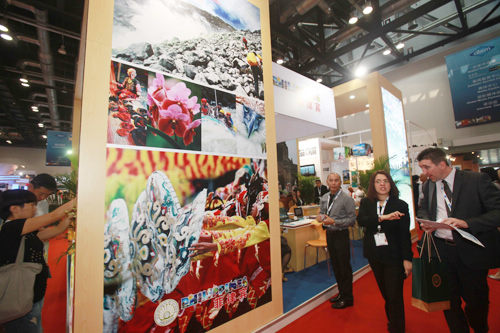|
 |
|
PROMOTING TOURISM: Visitors pass by the Philippines' pavilion at the China International Travel Mart 2011 in Beijing on August 30 (CHEN XIAOGEN) |
Former Chinese Ambassador to the Philippines Huang Guifang said Aquino's visit was expected to help enhance mutual trust and common understanding. Huang also said the huge earthquake in Japan earlier this year and recent turbulent regional situations in Central, East and North African countries had greatly hurt the Philippine economy.
Japan is the Philippines' biggest official donor and its major trade partner. The turbulence in Africa drove hundreds of thousands of Philippine workers back to their homeland. Huang said Aquino hoped his visit to China would provide a much-needed economic boost.
Chen Qinghong, another expert on Southeast Asian studies with the CICIR, said the two countries should consider long-term common development as a strategic priority. He said the world is struggling for economic revival in the shadow of the European and U.S. debt crises. Therefore, both China and the Philippines face a tough task of developing their economies and improving people's livelihoods.
By making the most of the potential for economic cooperation, the two governments can bring tangible benefits to their people, said Chen. He also said considering their close relationship as neighbors, the two sides Sea in a proper way.
Disputes remain
Recently, a dispute over the South China Sea has disrupted the normal friendship and cooperation between China and the Philippines. Countries concerned could put aside their disagreements and actively explore forms of common development in the disputed territory before a final solution is reached, Hu said during his meeting with Aquino.
Hu stressed China's stance and position on the South China Sea have been consistent and explicit. "The South China Sea dispute should be resolved peacefully through consultation and negotiation between countries concerned," he said.
Hu said China is ready to work with ASEAN countries, including the Philippines, to implement the Declaration on the Conduct of Parties in the South China Sea and jointly develop the waters into "a sea of peace, friendship and cooperation."
In the declaration, inked by China and ASEAN members in 2002, all concerned parties pledged to maintain self-restraint and avoid activities that might complicate or escalate disputes in the region. In July this year, China and ASEAN adopted an agreement that established guidelines for implementing the declaration, marking an important step toward a peaceful solution to the disputes.
Aquino also confirmed his government's stance on maintaining peace and stability in the region and implementing the declaration. The South China Sea issue does not constitute all bilateral relations, Aquino said, adding that the issue should not affect the development of friendly cooperation between the two countries.
Observers believe the positive attitudes shown by China and the Philippines will benefit both countries and help to promote bilateral trade and economic cooperation. "There is a strong political willingness from both sides to minimize the impact of the disputes on overall relations, which is good news for the two states," said Qu Xing, President of the China Institute of International Studies.
However, many experts pointed out the two sides eventually should find a way to settle the disputes in the South China Sea. Ye Hailin, a researcher with the Chinese Academy of Social Sciences, said further economic cooperation in oil and natural gas exploitation will inevitably touch the disputed areas.
During the administration of Maria Gloria Macapagal-Arroyo, Aquino's predecessor, China, Viet Nam and the Philippines reached an agreement on joint exploitation in the disputed region. But the Philippines quit the agreement due to pressure from Australia and the United States.
The Nansha Islands in the South China Sea have long been acknowledged as Chinese territory. Since the early 1970s after the region was found to be rich in oil and other natural resources, however, Southeast Asian countries including the Philippines, Viet Nam, Malaysia and Brunei have claimed sovereignty over all or part of the islands.
Ye said despite China's appeals for joint exploitation, the Philippines is unlikely to give up its sovereignty claims. He said that the two sides' agreement to minimize disputes at least proved that the South China Sea issue does not represent all aspects of the bilateral relationship.
Besides Beijing, Aquino also visited Shanghai and southeast China's Fujian Province. His mother, former Philippine President Corazon Aquino, was a fourthgeneration Chinese Filipino. Her greatgrandfather, who arrived in the Philippines in 1861, was a villager in Fujian.
Zhang Xuegang from the CICIR said that by visiting the hometown of his mother's family, Aquino helped promote mutual trust by stressing the two countries' historical and cultural ties, which can be traced back hundreds of years. Zhang believes the geographic, historic, cultural and even blood bonds between the two nations will strongly influence the future development of their relations.
"The two sides should put the South China Sea issue in a proper position, and then settle the issue in a peaceful manner," Zhang said. | 